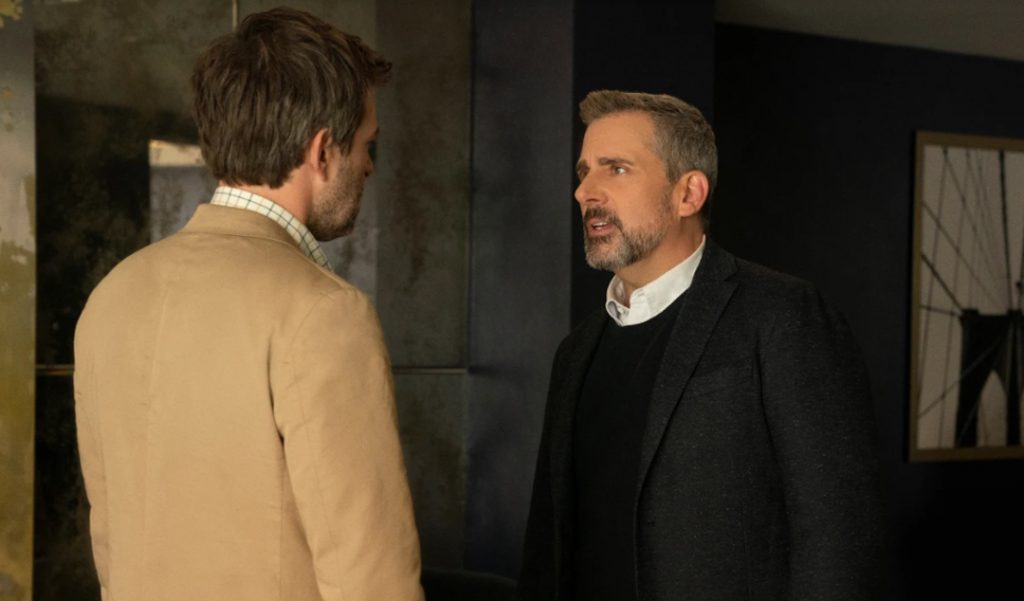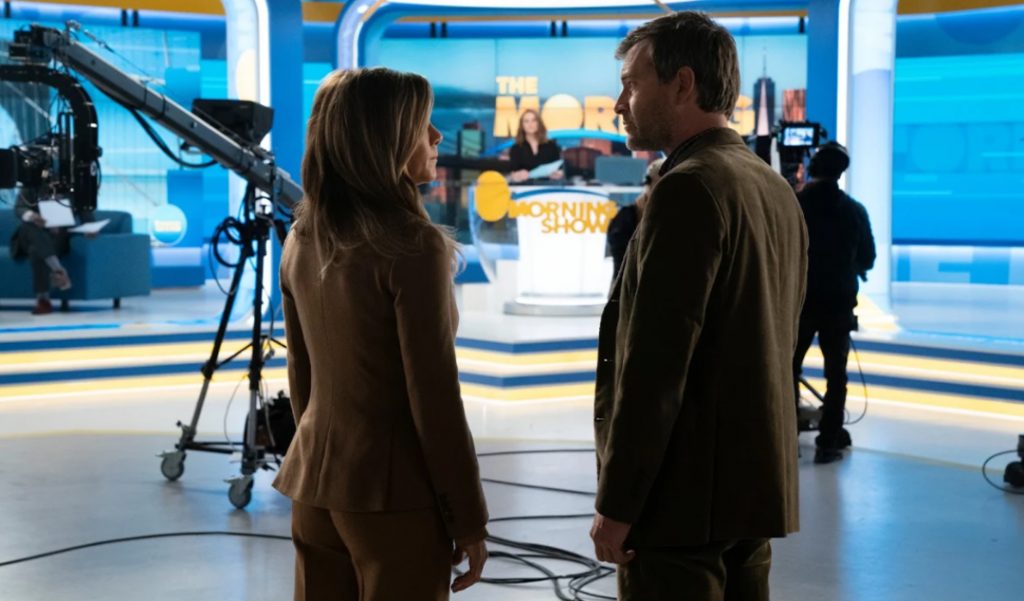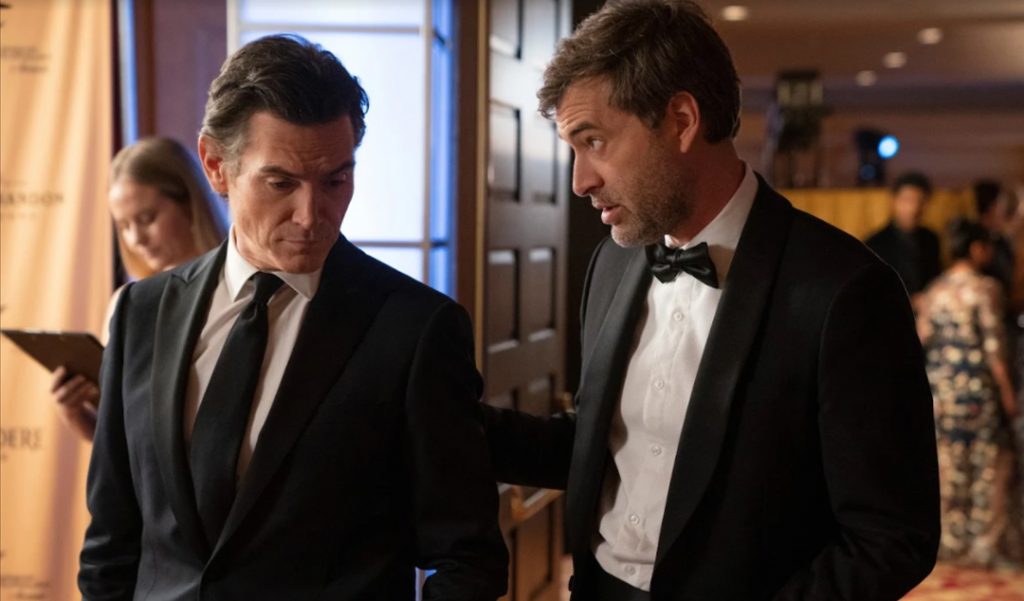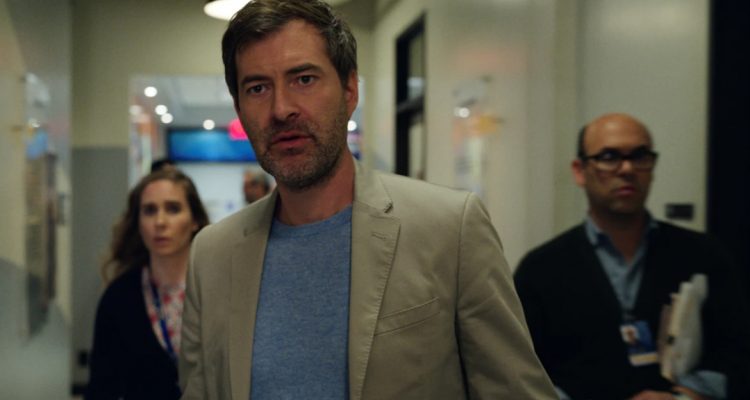Emmy nominated actor Mark Duplass has been a staple of the film and television business for over a decade, producing and acting in projects such as Kathryn Bigelow’s Zero Dark Thirty, HBO’s Room 104 and Colin Trevorrow’s grounded sci-fi masterpiece Safety Not Guaranteed.
His latest project, Apple TV+’s The Morning Show, is a masterclass in acting alongside an incredible cast that includes Oscar winner Reese Witherspoon and fellow Emmy nominees Steve Carell, Billy Crudup, and Jennifer Aniston.
In The Morning Show Duplass plays Chip Black, the continuously stressed producer shepherding the network’s live morning news program. In the opening episode, we find anchor Alex Levy (Jennifer Aniston) attempting to stabilize her show following the departure of disgraced co-anchor Mitch Kessler (Steve Carell).
Mitch’s sexual impropriety and abuse of power haunts the news program as it tries to move past the damning revelations and rebuild the news programs with two incredibly contrasting female anchors. The fallout from the scandal throughout season one is both fascinating and heartbreaking.
Duplass spoke to Awards Focus ahead of the Emmy’s, discussing Chip’s reasoning behind the leaked information on Mitch, his romantic feelings for Alex, and how the finale confrontation with Mitch was an incredible moment of self-realization.
AF: The character of Chip Black is really the glue to The Morning Show, and I’m curious what your process was for building that character?
Mark Duplass: A lot of the greatness of Chip is definitely on the page, so it’s important that I don’t take too much credit for a well-drawn character. This is a guy who lives only for his work, and it’s hard to tell who those people really.
They shape shift so well, and each and every conversation is to get people to do what he needs in order to keep the ship afloat. I felt like my job was to bring humanity, make him relatable, and make us feel his inner struggle. I added little stutters and things to the dialogue to naturalize him and give us a connection point.
The existential crisis that he undergoes was something that I really honed in on early. Chip is stressed out, obviously — he’s doing a live television show, which is hard enough to do, and a bombshell is dropped in the middle of it. It’s a stressful situation, but it was important that we had a place to go from the general stress of the situation into the internal stress of Chip.
He really thought he was on the right side of the story for a long time. He thought that because he wasn’t a predator himself, and he generally treats women with respect, he was doing enough.
Then he realizes that it was not enough. You have to be actively rooting out that behavior, calling it out, and make sure that you eliminate toxic behaviors in the workplace. He does not wake up to that until halfway through. That was a big shift from the external stress into the internal stress. He is not the man he thought he was.
AF: When Chip gets the note that he needs to go upstairs and he knows he’s going to be fired, it’s pretty much the curtain call for his career.
He has this U-turn from berating the control room staff to an impromptu goodbye speech mixed with a sort of pep talk. When you read that, how did you imagine it would be on the day?
Duplass: The truth of the matter is that even though The Morning Show is a big show, we moved at a pace that felt more like an independent film. There wasn’t a lot of time to shoot a lot of these scenes.
You read these scripts and get an idea for what you’ll do and how you’ll prepare, but then all of a sudden, you’re there, and it’s over (laughs). So a lot of it is very instinctual for me and I don’t really over-prepare.
A good example is that scene in the finale, where I’m in the middle of Bryant Park and I’m having a breakdown. I thought about that scene a lot — what is the right level of emotion, and the deep existential sadness versus self-pity. You think you’re gonna have all the time to get the nuances, and then you get there they’re like, “Ok, we’’re losing light, we gotta go.”
We shot it in about eighteen minutes. I enjoy the chaos of that whereas Billy (Crudup) is such a beautiful actor in terms of process. That really comes from his time in theater, and he prepares so delicately, but for me it’s a little more raw. I come from being a musician and an independent filmmaker, where we have to move fast. I’m a very instinctual person, and I like being thrown into the mill on figuring it out in the moment.
AF: One of the most hard hitting moments for me was when Chip gets the call from Bradley about the overdose death. He doesn’t try to convince her to go ahead with the interview, which was the only hope to save his job and career.
Chip totally understands why Bradley doesn’t want to go forward, knowing that it’s most likely the end of everything for him, he understands. It’s so powerful. Can you talk about that?
Duplass: This is the moment when he realizes how much bigger this thing is than him and his career. He has been trying to do what’s right, but at the same time, what’s right for him. That’s the moment that all goes away.
When he heads straight to Mitch to challenge him, he’s looking at another white male in a position of power that’s roughly his age. When he’s punching Mitch in the face, I think he’s punching himself in the face, too.

AF I felt validated that Chip was in love with Alex when they passed each other on the escalator. Chip knows she’s been talking to this other producer and he’s headed to be fired at her blessing so to speak. Anybody that wasn’t head over heels with that person would be cussing them out on the escalator.
Duplass: Chip is carrying a torch for her, and she’s his Achilles heel. He’s good at his job, and he’s good at getting people to do what he needs, but when it comes to Alex, there’s a weakness because he is in love with her.
He leaks information to the Times because he knows they’re going to get rid of Alex soon. He thinks that if he gets rid of Mitch first, they won’t get rid of both of them at the same time, because it’ll destabilize the show too much.
Chip expresses loyalty to Alex, and he was hoping she would express a similar loyalty to him. And he was wrong. Part of the reason that he didn’t scream at her is because he’s in love with her, but he’s also deeply ashamed of himself. He did something for her that he thought she would do for him, and she didn’t. He realizes that’s a weakness, and he’s ashamed.

AF: In terms of Cory’s relationship with Chip, does Chip feel like Cory could be an ally? Or is he just a lesser evil than Fred?
Duplass: What starts off as “This is guy I’m just going to have to deal with” turns quickly into, “I’m going to have to rely on someone here.”
There’s an argument to make that Cory is the most truthful person on this entire show, and simplest in terms of his motivations. Yes, he is a lesser evil than Fred, but the third level to their relationship is that Chip realizes he is out of his depth in this level of maneuvering.
As smart as Cory is, he’s out of his depth too. Instead of just abusing him and tossing him aside, Cory points that out to him. Chip is smart enough to realize that that makes him a specific kind of ally. I’m excited to see what will happen with those two in season two, because there is some level of an understanding there that is just beginning before shit hits the fan in season one.

AF: It’s coming up on a decade since Safety Not Guaranteed came out. Looking back, can you share some insight into that project?
Duplass: With some projects, you get lucky and they become special. There was a slightly underdog nature with that. Frankly, nobody wanted to make it with us and even when we brought it to Sundance, no one really wanted to distribute it.
Then all of a sudden, it just became this cult hit. It’s hard to identify what it was specifically that made it work, but I will say that there were three or four months in the editing room, where we were working on the movie and showing it to people, and it just did not work.
The movie was not supposed to end that way. I would like to claim we always had that vision, but we did not. We showed it to friends and peers, and I think it was a producer who came up with what we should do with the ending. I don’t want to take the mythology out of it, but it’s very important for filmmakers to understand that things don’t fall off the truck that way.
People need to understand that you can’t shut down the creative process and you always need to be open to new ideas, even as late as he had it.
Byron Burton also contributed to this article.


